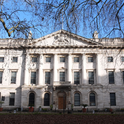As we know, the internet is fundamental to our domestic, industrial and international lives.
Where the internet opens up huge opportunities—an eighth of the UK’s GDP comes from the digital economy—we are also all too aware of the risks.
In May, we were exposed to the crippling impact that large-scale cyber-attacks can have on society when the WannaCry ransomware attacks hit the NHS amongst many other organisations, both in the UK and around the world.
The cyber threats we face continue to grow in scale and sophistication and cyber-crime is the most widespread.
It’s difficult to put an exact figure on the cost of cyber-attacks to the UK, but we do know it is likely to be in the billions.
The economic impact of cyber-crime is felt by most UK businesses—the Cyber Security Breaches Survey 2017 found that just under half (46 per cent) of all UK businesses identified at least one cyber-security breach or attack in the last 12 months.
I believe that every single one of us has a part to play in countering the threat of cyber-crime. From individuals, to businesses in the private sector and government, we all have a responsibility to ensure that the UK is one of the safest places to do business online and the public are properly protected.
Small actions can make a big difference. Experts advise that everyone should ensure that we have downloaded the latest software updates on our smartphones and tablets and that we use strong, separate passwords for our various online accounts.
But what is the government doing?
Well, in 2016 the National Cyber Security Strategy was published and is supported by £1.9bn of investment to 2021.
The National Cyber Security Centre (NCSC) became operational in October 2016 and forms a major part of this strategy, providing a single, central body for cyber-security at a national level.
The NCSC acts as a bridge between industry and government, providing a unified source of advice and support, including the management of cyber-related incidents.
Cyber-crime does not respect traditional boundaries, so it’s important that law enforcement agencies’ response reflects this. Under the first iteration of the National Cyber Security Programme from 2011-2016, £117m was invested to bolster law enforcement’s ability to tackle cyber-crime at all levels, and we are continuing to invest through the programme this year.
Law enforcement across England and Wales now operates as one nationally networked resource with the National Crime Agency (NCA) and Regional Cyber Crime Units using shared intelligence and capabilities.
To support the efforts of SMEs, regional cyber-crime prevention co-ordinators engage with businesses and the public to provide cyber-security advice based on the latest technical understanding from the NCSC.
A Dark Web Intelligence Unit has also been created which sits within the NCA and leads on operations against dark net criminals, including joint operations with industry and international law enforcement partners across the globe.
The National Cyber Security Programme also funds the Cyber Aware campaign, which works with public and private sector partners to encourage small business and individuals to adopt more secure online behaviour.
Recent high-profile cyber-security attacks, such as WannaCry, demonstrate the continued need for a co-ordinated response; between government, the NCSC, law enforcement and business. We will continue to invest in law enforcement capabilities at the national, regional and local levels to ensure agencies have the capacity to deal with the increasing threat from cyber-crime.
We all have a part to play in protecting the cyber-space. The government can’t do it on its own. From top to bottom, following good practice and having better security awareness will help build a safer place to trade and communicate.
We all have a part to play in protecting cyberspace
From individuals, to businesses in the private sector and government, we all have a responsibility
October 10, 2017

A live mag of cyber attacks in process. Photo: Flickr/Christiaan Colen











